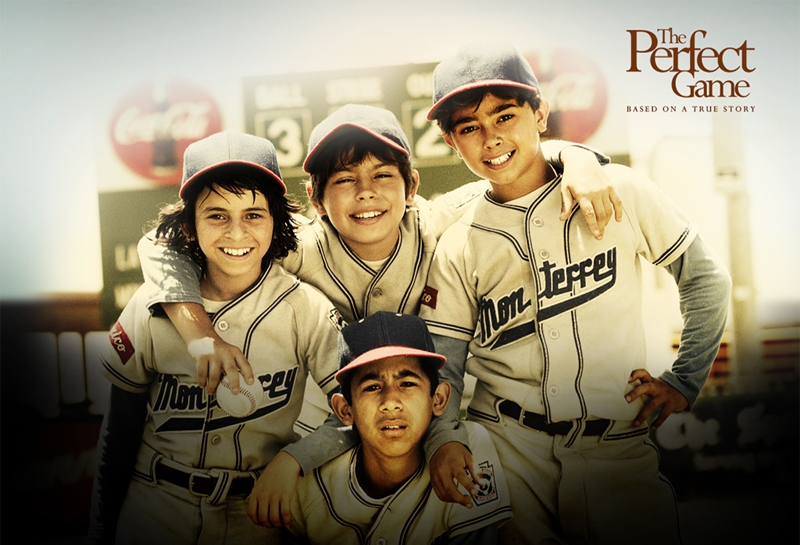- 2019/2020 Recap: Lady Scots Conquer First Round of CIF!
- 2019 Recap: Justin Flowe Wins the Dick Butkus Award
- Upland Lady Scots Have Their Revenge
- What is BBCOR?
- Tommy John, A Name To Be Feared
- The Game Plan
- Too Much Tackle?
- Is Cheer A Sport?
- Transgender Inclusion in Youth Sports
- Are You Counting Sheep Right?
The Perfect Game but not the Perfect Movie
- Updated: August 15, 2014
The Perfect Game: No runs, no hits, no walks, no players reaching base for any reason. It is one of the rarest occurrences in baseball. From 1904, when Cy Young pitched the first perfect game of the modern era, until 1957, when this movie is set, there were only four perfect games thrown in the Major Leagues. It isn’t just about good pitching. It takes every player on the team backing the pitcher, doing their part to make sure no one makes it to first base. A perfect game isn’t even strictly perfect. A player can make a fielding error, just as long as it doesn’t result in someone reaching base.
A perfect movie is just as rare as a perfect game. Making a movie requires so many people, from writers, directors, and actors, to the camera operators and lighting and sound technicians. Major mistakes in any of these positions can do more than just keep a movie from being perfect, it can make it not worth watching. This film is far from perfect.
In 1957, for the first time ever, a team from outside Canada or the United States played in the Little League World Series. The team was from Monterrey Mexico, a poor industrial town described by some as being like Pittsburgh but without the charm. Its little league team was made up almost entirely of kids from the poorest parts of this poor town. With one exception, all of them came from homes with dirt floors and without running water or electricity. What they did have was faith, not in themselves or in their own ability to play baseball. Faith in God.
The team began after the local Catholic priest, played by Cheech Marin, introduced the game of baseball to local children. He wanted to inspire them to hope for a better life than the one they knew. The boys grew to idolize players they had only heard about on Spanish language radio rebroadcasts of Major League games. Names like Yogi Berra and Mickey Mantle, Duke Snider and Pee Wee Reese. More than anything they wanted to play a real game of baseball in America. They started to play on a field they had made themselves, but they needed a real coach.
Enter Cesar Faz, played by Clifton Collins, Jr. Faz was born in San Antonio and had been a clubhouse attendant for the St. Louis Cardinals before moving back to his parents’ home town of Monterrey Mexico. The Little League hopefuls, played mostly by child actors who got their start on the Disney Channel and Nickelodeon, convince a reluctant Faz to coach them and he reluctantly agrees.
The team has to overcome seemingly insurmountable odds to even play their first game. Not only were the Monterrey players smaller than the Americans they would face, on average six inches shorter and 30 pounds lighter, they had to play after a 12 mile hike from the border, between Mexico and the US, to the baseball field. The most amazing thing about the hike is that everyone expected Monterrey to lose that game. I’m not referring to the American players, coaches and fans they would face. No one on Monterrey Industrial thought they would win a single game in America. Not the players, not the coaches. They hiked 12 miles in the hot Texas sun with only the clothes on their back and a change of underwear to play a game they believed they were going to lose.
It’s a great story, but this isn’t a great movie. A lot of people worked really hard to create beautiful shots with a lot of production value. There are sweeping crane shots and slick tracking shots. The lighting is lush, often making the poor neighborhoods of Monterrey look too good, as if they were shot on a backlot. The score by Bill Conti (Rocky) hits the obvious notes. Where the Perfect Game is let down is in the writing and acting.
Collins, who plays coach Faz and Marin, who plays the priest, deliver solid performances considering the material they have to work with. The four lead child actors, Jake T. Austin. (The Wizards of Waverly Place), Jansen Panettiere (The X’s), Moises Arias (Hannah Montana) and Ryan Ochoa (iCarly) are not All Stars. They do a decent job of going through the motions of the emotions their characters are supposed to be feeling. Their accents are another story. At some point, all of them drop their Mexican accents. Australian actress Emilie de Ravin (Lost) plays Frankie, a plucky reporter from a Texas newspaper who follows the team writing their story. She delivers clunky lines like, “I did not study journalism to get stuck on this back page assignment,” with an accent somewhere between a 1920’s reporter and Boston socialite. The only problem is that she’s a Texas reporter in 1957.
This leads to the writing. The movie is filled with stock characters, stock situations and stock dialogue. There is the gruff coach with a soft side who speaks only in sports clichés; the aforementioned plucky female reporter; the wise old black man who appears at just the right time to pass on arcane information; the racist ballplayers, coaches, fans, police, bus depot clerks and reporters. In fact at times it seems like all white men in 1957 were racist and the only white racially tolerant people were women. They say things like, “The Holy trinity of baseball is Home Runs, RBI’s and Batting Average,” or “That’s good stuff Mack, besides it’s my day off,” or “Ain’t no Mexican team gonna take our flag.”
Let’s be honest. A movie for children doesn’t have to be great. Complex characters and nuanced acting can actually be hard for a child to grasp. That’s why we see so many purely good heroes and totally evil villains in children’s movies. Clichés can be forgiven as long as the movie is entertaining. Clichés that cross the line to racial stereotype should not be forgiven. The groundskeeper played by Louis Gossett Jr fits Spike Lee’s definition of the offensive “Magical Black Man” stereotype perfectly. A few scenes later a southern Mammy offers to wash the only uniforms the boys have for them. Coach Faz, as portrayed in this film, often drinks to excess when times get tough. Family and friends of the real Faz say this is an invention for dramatic effect. The real Cesar Faz was a sober church going man. Writers often alter historical facts to make things more interesting, but it is lazy and offensive to turn the sober Cesar Faz into a drunken, hungover Mexican. The 1957 Little League World Series is a great story. The Perfect Game didn’t have to be a perfect movie, but it deserved to not be bad.
___________________________________________________________________________________________________
Author: David Pate
David Pate is a stand up comedian, karaoke singer and a writer and director of short films. When he has a free minute he writes movie reviews as well. His other reviews and updates on his short films live at The Life Cinematic.
One Comment
Leave a Reply
Copyright © 2023 KSNN. All rights reserved.










Pingback: New Website: Kid Sports News Network | Ms. Melanie